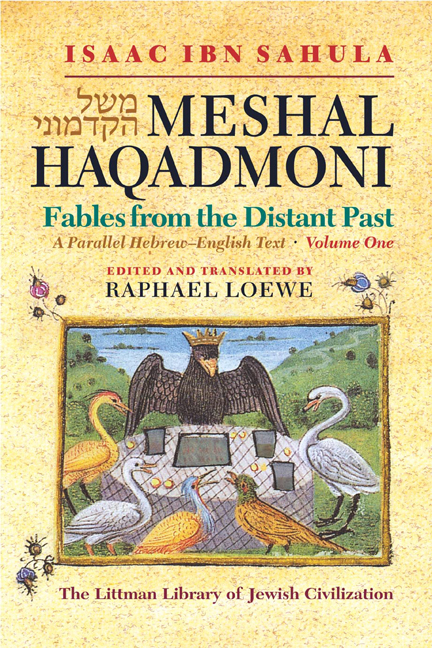Book contents
- Frontmatter
- Epigraph
- Publisher’s Note
- The Illustrations
- Preface
- Contents
- List of Abbreviations
- Introduction
- MESHAL HAQADMONI
- Part I On Wisdom
- Part II On Penitence
- Part III On Sound Counsel
- Part IV On Humility
- Part V On Reverence
- Appendices
- Bibliography
- Index of Citations
- Index of Key Hebrew Terms
- Index of Subjects
The Fırst Part
- Frontmatter
- Epigraph
- Publisher’s Note
- The Illustrations
- Preface
- Contents
- List of Abbreviations
- Introduction
- MESHAL HAQADMONI
- Part I On Wisdom
- Part II On Penitence
- Part III On Sound Counsel
- Part IV On Humility
- Part V On Reverence
- Appendices
- Bibliography
- Index of Citations
- Index of Key Hebrew Terms
- Index of Subjects
Summary
Through praise of wisdom and intelligence
Shall grant the simple wit and sapiencea
Cynic and Author here are seen
Discussing: their debate is keen
THE CYNIC cites the world's hard saw, to taunt
Those who would wisdom's might o’er evil vaunt,
And reckon penury is all the pay
That fools earn. ‘Highbrows’, he goes on to say,
‘Though ne’er so wise, wear out; no scholar's skill
Saves him from exile, or from falling ill;
A child born poor, whose birthright is his wit,
Must lead an uneventful life, for it
Will not protect, nor knowledge riches yield:b
Want darkens wisdom's light, its shading shield
Poverty takes awayc—all must await
(Wise though they be, or fools) a single fate.d
In Holy Writ the evidence we find
Clear to be seen, by one in his right mind;
Townsfolk a poor man's sound advice contemned,e
A king in Babylon to death condemned
All his wise men, whose fault was, they could not
Explain the dream that he himself forgot.f
Fools, on the other hand, at court reside
Or in some magnate's house, who will provide
Their commons—each street-cornerg is the haunt
Of dolts who, roistering, their valour vaunt,
And, careless, eat away. Wouldst thou, forsooth,
Make boast of knowledge, or the love of truth,
Know that thine own lot must the fool's equate,h
And hear this story of his tragic fate.
An ancient parable, I have heard tell,
Records that once in Egypt there did dwell
A man who, shrewd enough in his affairs—
Not modest, nor one given much to prayers—
Had fallen on ill times: though sons he had,
At making ends meet, they were just as bad,j
For all his honesty and intellect.
Things hid from sciencek strove he to detect,
Scant though his food and drink, midst moans and groans,
Knowing the Lord's affliction in his bones.l
His lads the while would go from house to house
Begging a crust, with many a sigh and grousem
To see their neighbours smirk, self-satisfied
At his ill fortune. “Fie on him”, they cried,
“And his philosophy, that would expose
Life's secret! Long ago, as he well knows,
The prophet warned, in words of Holy Writ,
Let not the wise man boast him of his wit.”n
- Type
- Chapter
- Information
- Meshal Haqadmoni: Fables from the Distant PastA Parallel Hebrew-English Text, pp. 42 - 152Publisher: Liverpool University PressPrint publication year: 2004

